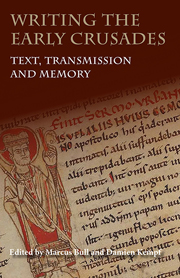Book contents
- Frontmatter
- Contents
- Acknowledgements
- List of Contributors
- List of Abbreviations
- Introduction
- Baldric of Bourgueil and the Familia Christi
- Guibert of Nogent, Albert of Aachen and Fulcher of Chartres: Three Crusade Chronicles Intersect
- Understanding the Greek Sources for the First Crusade
- The Monte Cassino Tradition of the First Crusade: From the Chronica Monasterii Casinensis to the Hystoria de via et recuperatione Antiochiae atque Ierusolymarum
- Nova Peregrinatio: The First Crusade as a Pilgrimage in Contemporary Latin Narratives
- What Really Happened to Eurvin de Créel's Donkey? Anecdotes in Sources for the First Crusade
- Porta Clausa: Trial and Triumph at the Gates of Jerusalem
- The Historia Iherosolimitana of Robert the Monk and the Coronation of Louis VI
- Towards a Textual Archaeology of the First Crusade
- Robert the Monk and his Source(s)
- Rewriting the History Books: The First Crusade and the Past
- The Ideal of Knighthood in English and French Writing, 1100–1230: Crusade, Piety, Chivalry and Patriotism
- Index
Robert the Monk and his Source(s)
Published online by Cambridge University Press: 05 May 2014
- Frontmatter
- Contents
- Acknowledgements
- List of Contributors
- List of Abbreviations
- Introduction
- Baldric of Bourgueil and the Familia Christi
- Guibert of Nogent, Albert of Aachen and Fulcher of Chartres: Three Crusade Chronicles Intersect
- Understanding the Greek Sources for the First Crusade
- The Monte Cassino Tradition of the First Crusade: From the Chronica Monasterii Casinensis to the Hystoria de via et recuperatione Antiochiae atque Ierusolymarum
- Nova Peregrinatio: The First Crusade as a Pilgrimage in Contemporary Latin Narratives
- What Really Happened to Eurvin de Créel's Donkey? Anecdotes in Sources for the First Crusade
- Porta Clausa: Trial and Triumph at the Gates of Jerusalem
- The Historia Iherosolimitana of Robert the Monk and the Coronation of Louis VI
- Towards a Textual Archaeology of the First Crusade
- Robert the Monk and his Source(s)
- Rewriting the History Books: The First Crusade and the Past
- The Ideal of Knighthood in English and French Writing, 1100–1230: Crusade, Piety, Chivalry and Patriotism
- Index
Summary
This paper considers the written source material that was used by the author known to us as Robert the Monk when he composed his account of the First Crusade, the Historia Iherosolimitana. Its aim is to throw some light on where this texts sits within the patterns of influences and borrowings that connect many of the narratives about the First Crusade written in the Latin Christian tradition. A further aim, though constraints of space preclude a detailed examination, is to suggest that the close study of texts such as that by Robert, a work that both drew upon a guide source and itself served as a source in its turn, requires an in-depth consideration of questions of reader response and authorial creativity if we wish to understand the dynamics that energized the burst of writing about the First Crusade in the early decades of the twelfth century.
It goes without saying that before a text can inform the writing of another work, it must be read. But read in what ways? Those who read a narrative of the First Crusade with the specific intention of themselves crafting another text on the same subject cannot be taken as a representative sample of all its readers, for they must have brought to the act of reading unusually heightened sensitivities as to matters of both content and form.
- Type
- Chapter
- Information
- Writing the Early CrusadesText, Transmission and Memory, pp. 127 - 139Publisher: Boydell & BrewerPrint publication year: 2014

